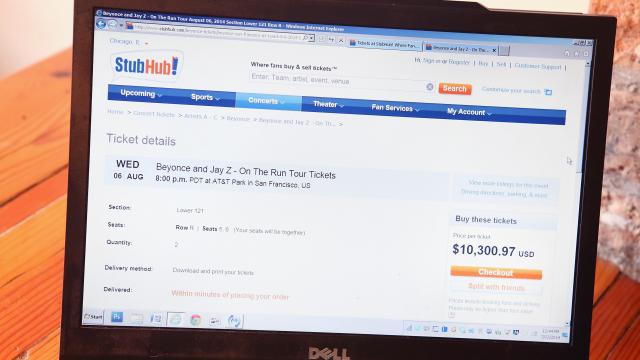As of today, StubHub has a new parent company. eBay has sold the ticket reseller to Viagogo for $6 billion in cash, a neat little profit when you consider eBay initially bought the company for $457 million back in 2007.
The sale isn’t a huge surprise, as eBay reportedly began exploring selling StubHub earlier in January after two of its investors urged the company to exit businesses that weren’t part of its core market. That said, StubHub accounted for about 14 per cent of eBay’s third quarter earnings, according to the Wall Street Journal.
The deal will also reunite StubHub with its co-founder, Eric Baker—who just so happens to also be Viagogo’s founder and CEO. Viagogo itself, is basically the Swiss-based version of StubHub, and a popular platform for reselling tickets to live events. Besides a corporate reunion, it makes sense Viagogo would want to buy one of its biggest rivals.
“It has long been my wish to unite the two companies. I am so proud of how StubHub has grown over the years and excited about the possibilities for our shared future,” Baker said in a joint statement with StubHub, eBay and Viagogo. “Buyers will have a wider choice of tickets, and sellers will have a wider network of buyers. Bringing these two companies together creates a win-win for fans—more choice and better pricing.”
Sounds nice in theory—but Viagogo’s reputation is spotty, to say the least. In 2017, it was accused of scamming consumers by pretending to sell tickets for events that weren’t even on sale yet.
Earlier in April, an Australian court found the company guilty of misleading consumers and slapping them with absurd booking fees of up to $77 per ticket.
New Zealand’s Commerce Commission received an “unprecedented number of complaints about Swiss company Viagogo,” in the year from July 2018 to July 2019. In 2017, the company was embroiled in a debacle with regard to an Ed Sheeran benefit concert, bumping up prices from £75 to £2,330 (roughly a markup from $141 to $4,428).
Meanwhile, last year UK Digital Minister Margot James outright told consumers on a BBC radio show, “Don’t choose Viagogo—They are the worst.” A gander into Viagogo’s Twitter mentions is a minefield of disgruntled ticket buyers and sellers, claiming they were unfairly ripped off, never sent tickets, or unable to claim a refund. Though, perhaps most damning is that Google suspended Viagogo as a global advertiser in July, citing advice from advertising regulators and the fact the company was in breach of its advertising policy.
To be fair, it’s not just Viagogo. Buying tickets off resellers is a crap hellscape regardless of what platform you’re buying on. Global regulators are trying to get a handle on the mess—U.S. Congress introduced the Better Online Tickets Sales Act (BOTS) in 2016 to try and stick it to scalpers and resellers, but lax reinforcement means its a lot of fancy legislation that doesn’t really do anything.
The U.S. Federal Trade Commission also held a workshop to explore consumer protection issues for online ticket sales in June. Most recently, a bipartisan group in the House launched a formal investigation just last week into ticket sales companies, including Live Nation, StubHub, Vivid Seats and Tickets.com, among others.
It’s not clear whether acquiring StubHub will make Viagogo better, or StubHub worse. Hopefully, not the latter. (Without regulation, it’ll likely still be hellishly awful.) In any case, the sale is expected to close in the first quarter of 2020, so until then it’s anyone’s guess.
